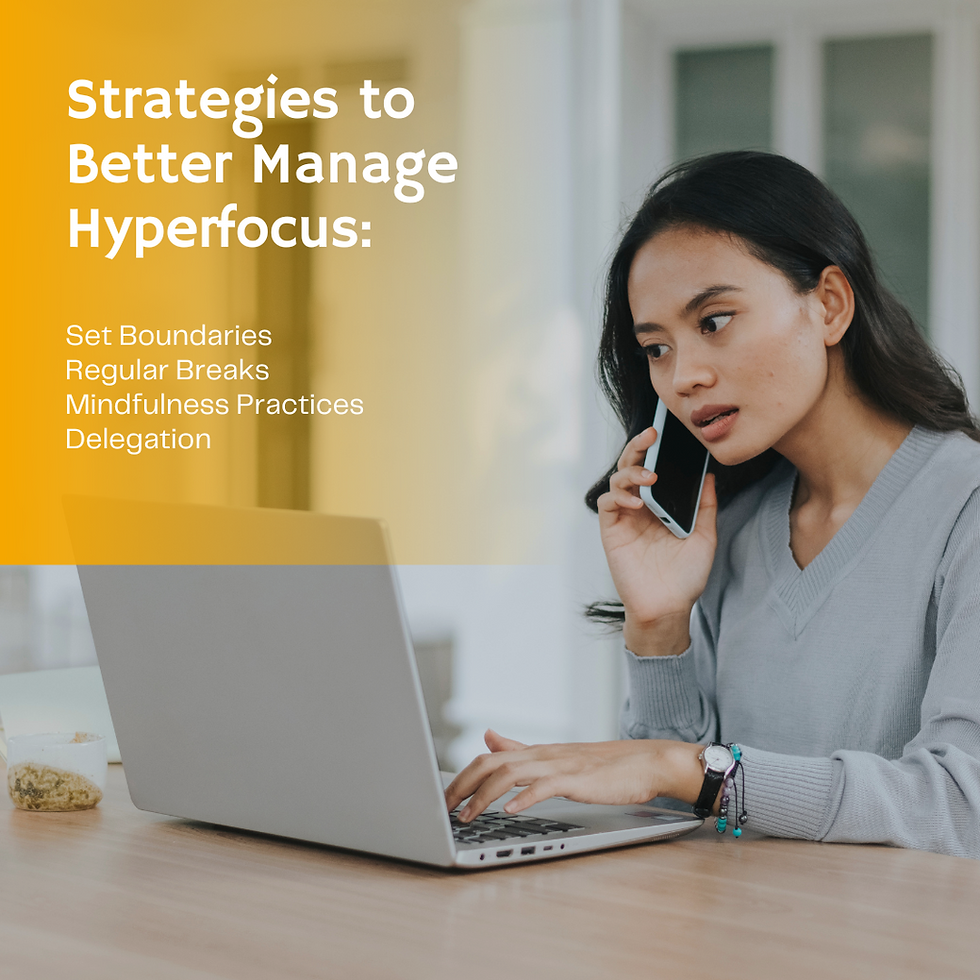Navigating the Thin Line Between Hyperfocus and Obsessive Thinking: A Personal Insight
 Gretchen Pound, PhD
Gretchen Pound, PhD- May 27, 2024
- 3 min read

This week, I had an eye-opening experience that gave me a deeper understanding of how hyperfocus can sometimes feel obsessive. As someone managing three businesses, I often find myself juggling multiple tasks and responsibilities. However, when I get into hyperfocus gear on a specific task, it becomes incredibly challenging to divide my time effectively among my various ventures. This experience made me realize how the intensity of hyperfocus can blur the lines of obsessive thinking.
The Experience
Earlier this week, I found myself deeply engrossed in a critical project for one of my businesses. What started as a simple task quickly turned into an all-consuming endeavor. Hours flew by, and I lost track of time entirely. Meals were missed, messages went unanswered, and other important tasks were left unattended. It wasn't until late in the evening that I finally stepped back and realized just how consumed I had become.
Hyperfocus in Action
Hyperfocus, for me, is both a blessing and a curse. It allows me to dive deep into a project, often leading to exceptional productivity and high-quality outcomes. When I'm in this state, distractions fade away, and I can accomplish what might take others days to complete in just a few hours. This intense concentration is driven by a passion for the task at hand and a desire to see it through to completion.
The Obsessive Edge
However, this week’s experience made me question if my hyperfocus was bordering on obsessive thinking. Like obsessive thoughts, my hyper-focus on this project became intrusive and all-consuming. Despite knowing that I had other responsibilities, I couldn't pull myself away. The need to finish what I started overpowered everything else, leading to a sense of compulsion rather than choice.
Similarities and Differences
Reflecting on this, I realized that while hyperfocus and obsessive thinking share some similarities, they are fundamentally different. Here’s what I noted:
Intensity and Preoccupation: Both states involve an intense level of mental engagement and preoccupation. I was so immersed in my task that other aspects of my life felt irrelevant.
Difficulty Shifting Focus: In both hyperfocus and obsessive thinking, shifting attention to other tasks becomes incredibly difficult. My thoughts kept returning to the project, even when I tried to take breaks.
However, there are key differences too:
Voluntary vs. Involuntary: Hyperfocus is typically a voluntary state where I choose to immerse myself in a task. Obsessive thinking, on the other hand, often involves involuntary, unwanted thoughts. My experience felt voluntary but teetered on the edge of compulsion, highlighting the thin line between the two.
Productivity vs. Distress: Hyperfocus usually leads to productive outcomes and a sense of accomplishment, whereas obsessive thinking often results in anxiety and distress. Despite the productive output, I felt a tinge of frustration and anxiety from neglecting other responsibilities.
Balancing Act
Managing three businesses requires a delicate balance, and this experience was a powerful reminder of that. Here are some strategies I'm implementing to better manage my hyperfocus:
Set Boundaries: Using timers and setting specific work hours for each business can help create a structure that prevents me from getting too absorbed in one task.
Regular Breaks: Scheduling regular breaks can help me step back and reassess my priorities, ensuring that I'm not neglecting other important tasks.
Mindfulness Practices: Incorporating mindfulness and relaxation techniques can help me stay grounded and aware of when my focus is becoming too intense.
Delegation: Trusting my team and delegating tasks can alleviate the pressure to do everything myself, allowing for a more balanced distribution of my time and energy.
Conclusion
This week's experience was a valuable lesson in understanding the fine line between hyperfocus and obsessive thinking. While hyperfocus can be a powerful tool for productivity, it's essential to recognize when it starts to edge towards obsession and take steps to maintain a healthy balance. By setting boundaries, taking regular breaks, practicing mindfulness, and delegating tasks, I aim to harness the benefits of hyperfocus without falling into the trap of obsessive thinking.
FYI: I finished the task that I hyper-focused on and now my life can return to normal until the next task that grabs my attention. Share your story about hyperfocus and how it’s similar or different to obsessive thinking.
And Remember
"I want to make a difference in people’s lives!
I work to ensure everyone has an
equal opportunity to succeed."
-- Gretchen Pound, PhD



